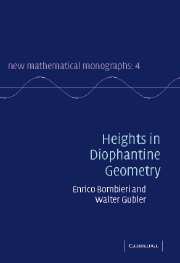Book contents
- Frontmatter
- Contents
- Preface
- Terminology
- 1 Heights
- 2 Weil heights
- 3 Linear tori
- 4 Small points
- 5 The unit equation
- 6 Roth's theorem
- 7 The subspace theorem
- 8 Abelian varieties
- 9 Néron–Tate heights
- 10 The Mordell–Weil theorem
- 11 Faltings's theorem
- 12 The abc-conjecture
- 13 Nevanlinna theory
- 14 The Vojta conjectures
- Appendix A Algebraic geometry
- Appendix B Ramification
- Appendix C Geometry of numbers
- References
- Glossary of notation
- Index
8 - Abelian varieties
Published online by Cambridge University Press: 14 August 2009
- Frontmatter
- Contents
- Preface
- Terminology
- 1 Heights
- 2 Weil heights
- 3 Linear tori
- 4 Small points
- 5 The unit equation
- 6 Roth's theorem
- 7 The subspace theorem
- 8 Abelian varieties
- 9 Néron–Tate heights
- 10 The Mordell–Weil theorem
- 11 Faltings's theorem
- 12 The abc-conjecture
- 13 Nevanlinna theory
- 14 The Vojta conjectures
- Appendix A Algebraic geometry
- Appendix B Ramification
- Appendix C Geometry of numbers
- References
- Glossary of notation
- Index
Summary
Introduction
This chapter contains fundamental preparatory material on abelian varieties and Jacobians of algebraic curves. Abelian varieties are defined as complete, geometrically irreducible, and geometrically reduced group varieties. The main properties of abelian varieties are obtained using the seesaw principle, the theorem of the cube, and the theorem of the square.
Classically, the theorem of the cube is proved directly using the theory of the Jacobian of a curve, then deducing the existence of the Picard variety, and the theorem of the square. On the other hand, once we have the Picard variety, it is easy to deduce both the theorem of the square and the theorem of the cube, Thus our philosophy will be to take for granted the existence of the Picard variety, borrowed as a result about representable functors from algebraic geometry, and deduce from this the basic theorems we need.
Section 8.2 contains preliminary material on group varieties, limited however to what is needed to develop the theory of abelian varieties. Section 8.3 deals with elliptic curves, including the well-known method for obtaining a Weierstrass model via the Riemann–Roch theorem.
The next three sections deal with the Picard variety and the theorems of the square and the cube. Section 8.7 studies the basic isogeny defined by multiplication by n. Section 8.8 contains the characterization of odd elements in the Picard variety. Section 8.9 studies the factorization of an abelian variety into simple abelian varieties and proves Poincaré's complete reducibility theorem.
- Type
- Chapter
- Information
- Heights in Diophantine Geometry , pp. 231 - 282Publisher: Cambridge University PressPrint publication year: 2006



